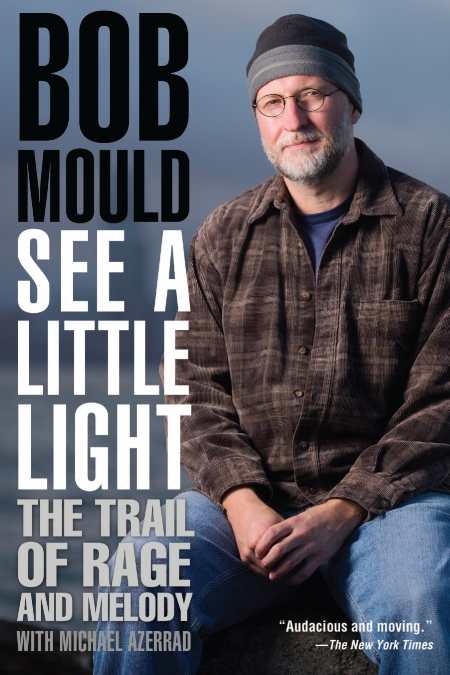
See a Little Light
The Trail of Rage and Melody
Front man of the seminal punk band Hüsker Dü opens up about growing up gay, his post-band life, and the music business.
Bob Mould’s impetus for penning this memoir arose from his realization that, “With age, I was beginning to forget the things I wanted to remember, which is quite different from remembering things I’d rather forget.” Little wonder that even his more cherished memories were at risk of fading, given his rich and storied professional and personal histories.
While today Mould is one of the more respected singer-songwriters of the late twentieth century independent music scene, he grew up quietly gay in a rural, extremely homophobic area of upstate New York. The youngest and favored child in a highly dysfunctional family ruled by an alcoholic father, he found escape in solitude and music—first immersing himself in ’70s pop hits before discovering mainstream rock bands like Kiss and then, finally, punk rockers like The Ramones. Shortly afterward, Mould found his own distinct compositional voice, a fusion of brutally honest lyrics and pop-inflected melodies played with manic intensity at excessive speed and extreme volume.
His early career as a founding member and front man of the seminal punk band Hüsker Dü—which aimed to be the loudest, fastest, hardest rocking unit on the scene, with real success—would provide ample grist for a typical rock memoir. Always the iconoclast, Mould instead covers that era in the first fourth of this engaging and well-written volume, saving the remaining pages for mapping the complex course of his life after that brash band’s demise.
Not that he glosses over those halcyon days. Nor does he flinch from revealing some of the dirtier secrets and nastier truths inherent to the music industry. There’s plenty of behind-the-scenes discussion of the important meetings, gigs, records, and songs from throughout his career in these pages, accompanied by previously unrevealed details concerning a variety of nigh-legendary events, including Hüsker Dü’s final band meeting.
While other musicians might have been content to drop names and move on, in See a Little Light those war stories serve as springboards for Mould to dive into a deep discussions. He discusses how music sales worked then as compared to today, the intricacies of assigning proper creative credit to ensure full return of royalties, and the importance of networking with other bands.
And while it’s true that Mould takes no prisoners, that doesn’t mean he spares himself. There are repeated examples where his blunt assessments of how his own ill-considered actions, decisions and remarks drove wedges between him and his bandmates, friends, and lovers, making for some extremely difficult or even painful reading.
Still, as compelling as Mould’s public life might be, the core of this book lies in his struggle to find himself and his proper place in the world. Ultimately, it’s his ongoing quest to transform himself from an isolated and work-obsessed individual into someone who’s actively involved with his community and lover on multiple levels that informs his life’s story—and which makes See a Little Light such a compelling and rewarding read.
Reviewed by
Bill Baker
Disclosure: This article is not an endorsement, but a review. The publisher of this book provided free copies of the book and paid a small fee to have their book reviewed by a professional reviewer. Foreword Reviews and Clarion Reviews make no guarantee that the publisher will receive a positive review. Foreword Magazine, Inc. is disclosing this in accordance with the Federal Trade Commission’s 16 CFR, Part 255.
